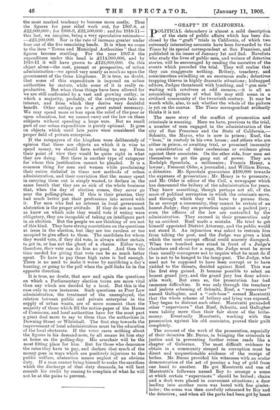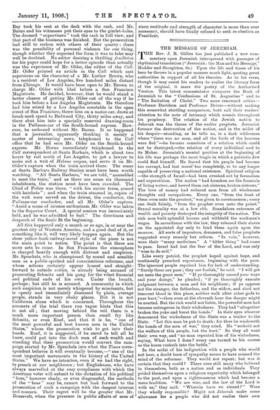" GRAFT " IN CALIFORNIA.
pOLITICAL debauchery is almost a mild description of the state of public affairs which has been dis- closed by the " graft ' trials in California, of which two extremely interesting accounts have been forwarded to the Times by its special correspondent at San Francisco, and published in its issues of January 1st and. 2nd. Novelists who study the lives of public men, and writers of detective stories, will be encouraged by reading the narrative of' the events which preceded the trial. They will realise that they can exaggerate nothing. Bribery, treachery, and conscienceless swindling on an enormous scale; detectives trapping thieves in highly dramatic situations ; kidnapped. editors, Judges threatened with lynching, and "gun men" waiting with revolvers at odd corners,—it is all an astonishing picture of what life may still mean in a civilised community of the twentieth century. It may be worth while, also, to ask whether the whole of the picture is yet on the canvas. The Times correspondent evidently thinks it is not.
The mere story of the conflict of prosecution and criminals is amazing. Here we have, previous to the trial, a number of men engaged in the administration of the city of San Francisco and the State of California,— Schmitz, the Mayor, who is now in prison; Ruef, the "boss," in custody in his own house ; and others who are either in prison, or awaiting trial, or promised immunity in consideration of their confessions or evidence given against their associates. On the other side, four men set themselves to get the gang out of power. They are Rudolph Spreckels, a millionaire ; Francis Heney, a lawyer ; Fremont Older, a journalist; and William Burns, a detective. Mr. Spreckels guarantees $100,000 towards the expenses of prosecution ; Mr. Heney is to prosecute; and Mr. Older is editor of the Call, a newspaper which has denounced the bribery of the administration for years. They know something, though perhaps not all, of the maze of political corruption in which the criminals move, and through which they will have to pursue them. In so corrupt a community, they cannot be certain of an honest Judge ; they are powerless against a packed jury ; even the officers of the law are controlled by the administration. They succeed in their prosecution only by an accident. Rua made a mistake. He tried to get himself appointed District Attorney, and the public would not stand it. An injunction was asked to restrain him from taking the post, and the Judge was given a hint which the most corrupt official could scarcely disregard. When two hundred men stand in front of a Judge's chambers and shout for a rope, the Judge must be more than usually courageous not to inquire what he must do if he is not to be hanged to the lamp-post. The Judge, who need not be supposed to have been corrupt or to have Yielded to the threats, decided against Ruef. This was the first step gained. It became possible to select an. honest grand jury, and the grand jury has done admir- able work. But even so, the prosecution has had. immense difficulties. It was only through the treachery and jealous scheming of Schmitz, Ruef, a " supervisor ' named Gallagher, and a "sub-boss" named Maestretti that the whole scheme of bribery and lying was exposed. They began to distrust each other. Maestretti persuaded other " supervisors " that Ruef, Schinitz, and Gallagher were taking more than their fair share of the bribe- money. Eventually Maestretti, working with the prosecution against his old associates, proved their guilt completely.
The account of the work of the prosecution, especially of their detective Mr. Burns, in bringing the criminals to justice and, in preventing further crime reads like a chapter of Gaboriau. The most difficult evidence to obtain in a community steeped in corruption must be direct and unquestionable evidence of the receipt of bribes. Mr. Burns provided his witnesses with an ocular demonstration of the act of passim, a bag of gold from one hand to another. He got Maestretti and one of Maestretti's followers named Roy to arrange a scene at which certain " supervisors " should be bribed ; chairs and a desk were placed in convenient situations ; a door leading into another room was bored with fine gimlet- holes ; the scene was then carefully rehearsed by Roy and the detective ; and when all the parts had been got by heart Roy took his seat at the desk with the cash, and Mr. Burns and his witnesses put their eyes to the gimlet-holes. The doomed " supervisors " took the cash in full view, and that part of the business was finished. But the prosecution had still to reckon with others of their quarry ; there Was the possibility of personal violence for one thing, though whether they expected the form it was to take may well be doubted. No editor desiring a thrilling fewilleton for his paper could hope for a better episode than actually was the experience of Mr. Older, the editor of the Call. Mr. Older printed an article in the Call which cast aspersions on the character of a Mr. Luther Brown, who is a resident of Los Angeles, five hundred miles distant from Vhicago. It would have been open to Mr. Brown to charge Mr. Older with libel before a San Francisco Magistrate. He decided, however, that he would stand a better chance of getting Mr. Older out of the way if he took him before a Los Angeles Magistrate. He therefore had. him seized by a Los Angeles constable in the open street of San Francisco, threw him on a motor-car, drove at break-neck speed to Redwood City, thirty miles away, and there shut him into a specially reserved drawing-room in the Pullman-car of the South-hound express. How- ever, he reckoned without Mr. Burns. It so happened that a journalist, apparently thinking it merely a matter of interesting news, telephoned to the Call office that he had seen Mr. Older on the South-bound express. Mr. Burns immediately telephoned to the Call correspondent at Santa Barbara, which is about two hours by rail north of Los Angeles, to get a lawyer to make out a writ of Habeas corpus, and serve it on Mr. Older's captors when the train arrived there. The scene at Santa Barbara Railway Station must have been worth watching. "All Santa Barbara," we are told, "assembled to meet the train," and as there are some six thousand inhabitants, the station must have been crowded. The Chief of Police was there, "with his entire force, armed with hatchets " ; and when the train steamed in, copies of the writ were served on the driver, the conductor, the Pullman-car conductor, and all Mr. Older's captors. "Amid a scene of intense enthusiasm Mr. Older was taken to the Superior Court. A special session was immediately held, and he was admitted to bail." The directness and despatch of the finale fit the beginning.
All this happened only a month or so ago, in or near the greatest city of Western America, and a good deal of it, or something like it, will very likely happen again. But the sheer yellow-back-railway-novel style of the piece is not the main point to notice. The point is that there are more acts to come. In San Francisco the atmosphere is charged heavily enough with distrust and suspicion. Mr. Spreckels, who is championed by sound and sensible men as a public-spirited and conscientious reformer, and whose actions certainly appear honest and straight- forward to outside critics, is already being accused of prosecuting Schmitz and his gang for the vilest financial and political ends of his own. Under the breath, perhaps ; but still he is accused. A community in which such suspicion is not merely whispered by miscreants, but is openly and immediately discussed by plain, average people, stands in very shaky places. But it is not California alone which is concerned. Throughout the accounts of the trial there run vague hints that this is not all ; that moving behind the veil there is a much more important person than small fry like Schmitz, or even Ruef, and that it is he, "one of the most powerful and best known men in the United States," whom the prosecution wish to get into their hands. Ruef, it is suggested, if he cared to tell all he knew, could put into the dock men of such wealth and standing that their prosecution would convert the cam- paign started by Mr. Spreckels into what the Times corre- Spondent believes it will eventually become,—" one of the most important movements in the history of the United States." We have no intention, even if we had the right, to preach at our neighbours ; but Englishmen, who have always marvelled at the easy compliance with which the American voter will submit to the dictation of his political "boss," however shady, or even disgraceful, the methods of the " boss " may be, cannot but look forward to the prosecution of such a campaign with the deepest interest and concern. Their regret will be the greater that Mr. Roosevelt; when the presence in public affairs of men of stern rectitude and strength of character is more than ever necessary, should have finally refused to seek re-election as President.











































 Previous page
Previous page